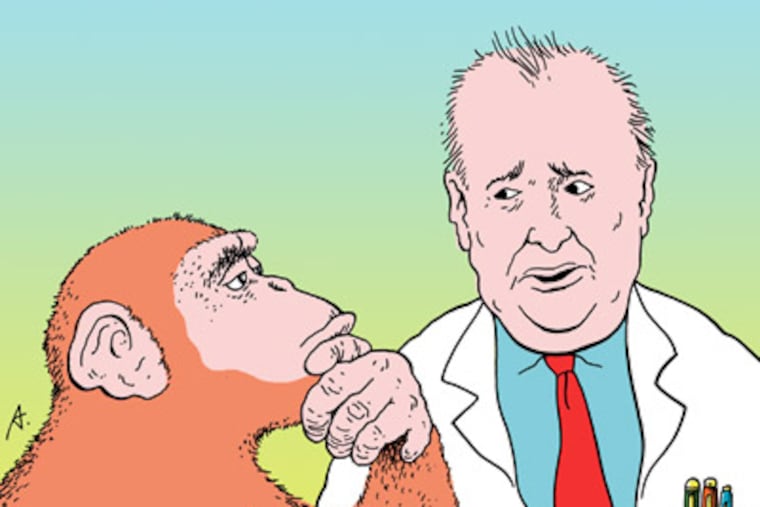On climate change, society trails science
Recent revelations are highlighting the corrosive nature of our national dialogue about climate change.

Recent revelations are highlighting the corrosive nature of our national dialogue about climate change.
Bloggers recently published what appear to be internal documents from the Heartland Institute, a group that has long sought to undermine public understanding of climate science. The documents detail the organization's plan to introduce misleading information about climate change to science classrooms as part of a larger campaign to constrain the American response to the problem. And last week, a highly regarded climate scientist revealed that his frustration over continuing attacks on climate science led him to trick Heartland into sending him its documents.
Sadly, stolen documents and e-mails, opaque corporate financing of interest groups, and a simple lack of civility have come to define the public discourse on climate change.
There is a better way.
The truth is that the scientific community has reached a consensus on climate change. The buildup of heat-trapping emissions from burning fossil fuels and clearing forests is changing the climate, posing significant risks to our well-being. Reducing emissions and preparing for unavoidable changes would greatly reduce those risks. That is the conclusion of the U.S. National Academy of Sciences, the world's leading scientific societies, and the overwhelming majority of practicing climate scientists.
But many people don't accept the facts. Social scientists - psychologists, sociologists, and the like - can help us understand why. When they examine climate change, they see what Yale and George Mason University researchers identify as "Six Americas." They range from "Dismissives," who are hostile to the science, to the "Alarmed," who worry that we are running out of time to reduce emissions.
How can a divided America come together and address climate change? The institutions we work for recently convened social scientists, climate scientists, business leaders, politicians, and faith leaders to help us answer that question.
According to social scientists, when people hear scientific evidence about societal risks - whether they concern climate change, disposal of nuclear waste, or vaccines - they actively filter it. They accept evidence they find consistent with deeply held cultural values and reject evidence they feel challenges those values.
A powerful way to break through is for respected leaders to speak out and bring shared values to bear on climate risks and choices. Many people who spoke at the conference are doing just that and helping to build a respectful, fact-based dialogue about climate change.
For businesses, climate change can be framed as a risk and an opportunity. Steve Percy, the former head of BP America, said "the train has left the station" when it comes to businesses dealing with climate change. Many major corporations accept the science and have already begun to integrate considerations about climate change into their products and business plans.
For people of faith, the Rev. Sally Bingham invokes the second commandment. If we love our neighbors as we love ourselves, she said, it is wrong to pollute our shared atmosphere. Richard Cizik, the president of the New Evangelical Partnership for the Common Good, says speaking to other evangelicals about stewardship and respecting creation makes it so that "they cannot walk away from this issue."
For conservatives, climate change action is about accountability, said Bob Inglis, a former Republican congressman from South Carolina who enjoyed high ratings from the National Rifle Association and the American Conservative Union. He supports axing taxpayer subsidies for fuels because "we don't want the government picking winners and losers." He also supports building the health and environmental costs of pollution into the price of fuels so the marketplace can properly judge them.
There's no straight line between scientists identifying a major risk and society agreeing on how to address it. The surgeon general's 1964 report on the dangers of smoking was followed by decades of industry attempts to discredit the science. Building a social consensus that smoking is harmful required public-health campaigns that raised awareness and generated support for legislative action.
The climate challenge is now largely a social one. Meeting it will mean continued coalition-building and expanding the community of people who care about climate change to include unions, religious groups, taxpayer groups, and businesses from Wall Street to Main Street. That means engaging on this issue at the local level, in face-to-face conversations at Kiwanis clubs, church groups, bowling leagues, and town halls.
The task before us is nothing short of monumental. But the path forward is becoming clearer. And we must take it - together.
of the Erb Institute at the University of Michigan. Peter C. Frumhoff is director of science and policy at the Union of Concerned Scientists. They can be reached at ajhoff@umich.edu and pfrumhoff@ucsusa.org. This was distributed by McClatchy-